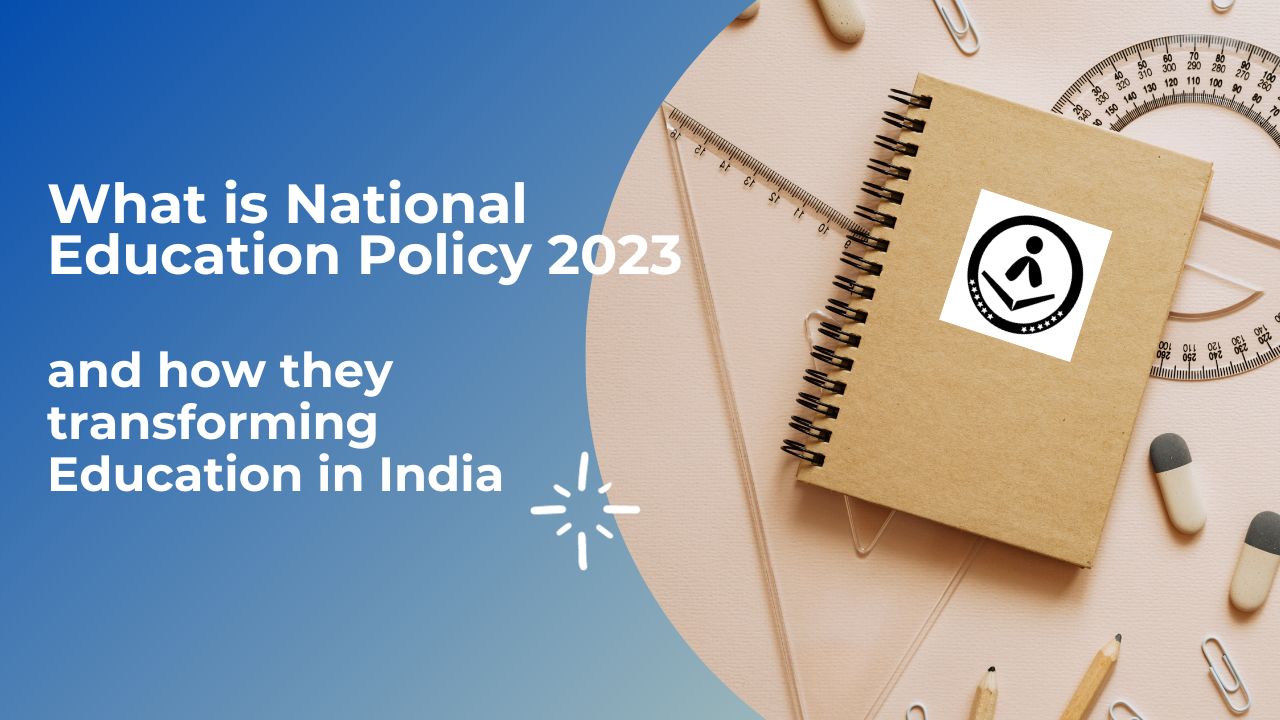
Author : Potential and Concept Group of Education
What is National Education Policy 2023 and how they transforming Education in India
November 1st,2023
The National Education Policy (NEP) of 2020, now often referred to as NEP 2023, marks a significant milestone in the evolution of the Indian education system. It aims to bring about a complete transformation by 2030, focusing on modern teaching methods, technology adoption, practical skills, and holistic student development. This blog delves into the key highlights and changes introduced by NEP 2023, shedding light on its impact and potential to revolutionize education in India.
Introduction to National Education Policy 2023
The NEP 2023 builds upon the National Education Policy of 2020, ushering in an era of progressive reforms and innovative educational practices. It seeks to reshape the Indian education system to cater to the diverse needs of students while fostering creativity, critical thinking, and digital literacy.
One of the primary objectives of NEP 2023 is to create a more holistic education system, which not only imparts knowledge but also equips students with essential life skills. Let's explore some of the key highlights and changes brought about by this policy.
National Education Policy 2023: Highlights
Structural Change:
The most significant structural change introduced by NEP 2023 is the shift from the traditional 10 + 2 education system to a 5 + 3 + 3 + 4 model. This new structure includes four stages: Foundational, Preparatory, Middle, and Secondary. The stages are designed to facilitate a smooth transition of students from one level to the next, promoting a holistic and well-rounded education.
Literacy Goal:
A central focus of NEP 2023 is to achieve universal foundational literacy and numeracy in primary schools by 2025. This goal is considered a top priority, and a National Mission on Foundational Literacy and Numeracy has been set up to achieve it. State and Union Territory governments are tasked with creating implementation plans to ensure every primary school achieves this goal by 2025.
Examination Structure:
The policy introduces a revamped examination structure to reduce the burden of exams on students. Instead of annual exams, students will participate in exams at the end of classes 2, 5, and 8. This approach aims to promote holistic learning and reduce the pressure associated with high-stakes exams. Board exams for classes 10 and 12 will undergo significant changes, including a move to biannual exams and a shift towards objective-descriptive formats.
Language Emphasis:
NEP 2023 emphasizes the use of the mother tongue as the medium of instruction up to grade 5. This focus on teaching in the mother tongue is intended to enhance students' comprehension and facilitate better communication with teachers. It is also seen as a way to strengthen students' connection to their cultural roots.
Interdisciplinary Curriculum:
The policy promotes an interdisciplinary and multilingual approach to education, encouraging students to explore subjects across different streams. This shift allows for cross-disciplinary learning and the development of a well-rounded skill set.
Technology Integration:
NEP 2023 recognizes the importance of technology in education. It encourages the integration of technology into the curriculum and emphasizes the significance of coding and practical, experiential learning. This prepares students for a technology-driven world and equips them with essential digital skills.
Health Focus:
The policy extends the mid-day meal scheme to include breakfast, showing a commitment to students' overall health and well-being. Additionally, counselors and social workers will be introduced to address students' mental health and provide support as needed.
Higher Education Reforms:
The policy introduces several changes in higher education, including the establishment of multidisciplinary bachelor's degrees, the discontinuation of M.Phil. courses, the creation of a Higher Education Commission of India, and the regulation of fees in both private and public universities. It also envisions the phasing out of college affiliations, the establishment of district-level universities, and the transformation of all universities into major multidisciplinary institutions by 2040.
Teacher Policy Alterations:
NEP 2023 brings about significant policy changes in teacher education. It lays down eligibility criteria for teachers, requiring a 4-year Bachelor of Education by 2030. The policy aims to strengthen teacher recruitment processes, enhance transparency, and establish a National Curriculum Framework for Teacher Education and National Professional Standards for Teachers.
Differences Between NEP 2023 and NEP 1986
To better understand the significance of NEP 2023, it's essential to compare it with the older National Education Policy of 1986. Several key differences highlight the progressive nature of the new policy:
Holistic Approach:
NEP 2023 takes a holistic approach, emphasizing multiple dimensions of student development, including skills, technology, and experiential learning. In contrast, the focus of NEP 1986 was primarily on exam results and academic degrees, with a strong emphasis on improving national literacy.
Language Emphasis:
The latest policy places a strong emphasis on teaching in the mother tongue, which was largely absent in NEP 1986. This shift aims to enhance language proficiency, cultural connections, and student-teacher relationships.
New Education Structure:
The introduction of the 5 + 3 + 3 + 4 system in NEP 2023 represents a paradigm shift in the education structure, a departure from the traditional approach in NEP 1986.
Multidisciplinary Approach:
NEP 2023 promotes cross-disciplinary learning, allowing students to choose subjects across streams. This contrasts with the rigid subject choices of NEP 1986.
Education from Early Stages:
The new policy highlights the importance of early childhood education, an aspect not addressed in NEP 1986.
Technology Integration:
NEP 2023 recognizes the need for technology integration in education, a concept that was not prevalent in NEP 1986.
Vocational Education:
The policy encourages vocational education and skill development from a young age, preparing students for their careers. This was not a significant focus in NEP 1986.
Experiential Learning:
NEP 2023 advocates for experiential learning, which is a departure from the rote learning approach of NEP 1986.
Changes in Assessment Methods:
The policy introduces changes in assessment methods, including continuous and comprehensive evaluation, while NEP 1986 primarily relied on traditional exams as the main benchmark of student performance.
Conclusion
The National Education Policy 2023 is a game-changing document that outlines a new vision for the Indian education system. It focuses on holistic student development, technological integration, interdisciplinary learning, and equitable access to quality education. With a clear emphasis on foundational literacy and numeracy, the policy aims to shape the future of education in India by nurturing creativity, critical thinking, and problem-solving skills.
The shift from the traditional 10 + 2 system to a more flexible 5 + 3 + 3 + 4 structure, the emphasis on mother tongue instruction, and the promotion of vocational education all reflect the forward-thinking nature of NEP 2023. These changes, along with the policy's focus on teacher education and the use of technology, have the potential to revolutionize the education landscape in India.
As the policy is implemented and its provisions put into practice, it is expected to address long-standing
Comments
Leave a Comment
Your email address will not be published. Required fields are marked *
Thank You! Your comment has been sent for approval.
Categories
Four Year School Integrated Program 9
Two Year School Integrated Program 3
Results 3
Articles 17

Featured Posts
 |
Why Shri Shyamkanu Mahanta's Daughter Chooses P&C Academy for Engineering Excellence! |
 |
Shri Pranjal Baruah: A Dedicated ACP and Supportive Father Inspiring Dreams at P&C Academy Integrated School |
 |
Empowering Futures: P&C Academy's Transformative Mentorship Program for Special Students |
 |
What is National Education Policy 2023 and how they transforming Education in India |
